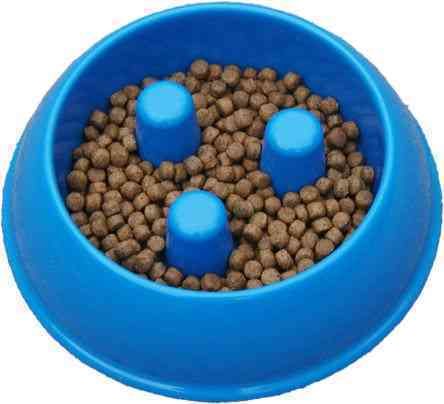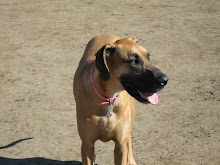
Bloat, also known as gastric dilatation, is a condition in dogs that can kill the dog in a matter of hours. Unlike in human where the person simply sits down and relaxes for a little while after feeling bloated and it will go away, when there is a bloat in a dog, it could literally kill your dog. When a dog is suffering from bloat, it means that its stomach is distended. This is sometimes followed by the stomach getting twisted. If the stomach gets twisted, the food substances in the stomach will get trapped while the gas volume continues to increase.
This is dangerous in that as the gas volume continues to increase, it can literally press against blood veins and arteries inhibiting the flow of blood. If this is not stopped on time, the dog will get less blood in its brain causing the brain to shut down and the dog to go into shock. With consistent swelling, the spleen will get affected resulting in it being dislodged from its normal position. This has been known to both twist the spleen and stop the flow of blood completely. With increased gas pressure and lack of blood flow on the stomach walls, the areas that tighten in the stomach pack up and die.
Everything that was just described in the first paragraph can happen in a matter of minutes depending on the severity of the bloating. So what are the signs and symptoms one should look for in a dog so as to quickly detect if the dog is having a bloat? The signs are many. This is coupled with the fact that the symptoms can vary in different dogs. For example, five dogs may be having a bloat in the same compound and all the symptoms would look different from each other.
Some of the more common symptoms in a bloat are panting, pacing forwards and backwards, agitation, drooling, foaming at the mouth, difficulty walking, anxiety, discomfort, retching, inability to lie on its side, stomach distension and restlessness. The stomach in this case usually appears abnormally huge in size –more like when a dog has swallowed a basket ball or two- and is hard to the touch. Other obvious symptoms are pale gums bordering on grey or ash, weak pulse rate and a fast heart beat. If you notice symptoms of bloat in your dog you must consult your vet immediately. If the pressure is not released it can, as already described, be fatal for your dog.
The causes of bloating in a dog can be prevented. Some of the preventive methods are making your dog eat calmly; not by gulping or snorting its food, and avoid stress as much as possible. Whether the stress is in the form of boarding stress or stress of travel it could potentially be harmful around meal time. Avoid giving your dog too much bread and by not mixing soy with its diet – while this has not been proven yet; some breeders and dog owners have noticed their dog developing bloat after a meal mixed with soy. Keeping your dog calm immediately after eating is also an excellent way to prevent bloat from occurring. It is challenging as many dogs including mine get very excited around meal time and that translates into playful excitement after the meal as well.
There are few products on the market today that are specifically designed to slow your dog’s eating. Most notably is the Brake-Fast bowl which has three columns in the bowl area to prevent your dog from taking large mouthfuls of food at the same time.






4 comments:
I did not know about bloat. Last Tuesday 08/26/2008, my Chow Chow Bella Bear was going in and out of the dog door and made a little whinning noise. I knew immediately that something was amiss. I went to her and I usually give her a belly rub and to my surprise, her abdomen was hard as a blown up balloon and Bella cried again. I called my Vet right away and they told me not to bring her in, but to take her to the Emergency Animal Hospital immediately plus adding that this is life threatening. I immediately drove Bella to the hospital and they were waiting for my arrival due to a call from my Vet and within a half hour, Bella was in emergency surgery. I was lucky and Bella even luckier as the surgery was a success and she is home with me now. I was fortunate enough to have noticed the symptoms and reacted quickly. It saved her life! Her stomach turned 90 degrees and her spleen was moved, but because this was corrected right away, there was no damage to any organs. Her stomach was repositioned and spleen put back with no ill effects. Bella is in recovery and in the healing process that will take about 3 weeks. We are grateful to have terrific Vets and owe them our eternal graditude. Everyone that has a dog should be armed with the knowledge required to look out for bloat. Bloat can kill within hours!
My dog bloated last year thankfully I knew the symptoms and all ended up well. glad to see your post here and stumbled upon it when writing about bloat on my own blog. Thunderstorm season upon us and some dogs get so worked up and over heated that they then drink too quickly causing trapped air and fluid, at least this is what happened to my dog. Nice to see a fellow blogger giving health warnings as well:)
Thank you for posting this information regarding Bloat and Dogs. I almost lost my Golden retriever Chow because of this. I had to argue with my husband about taking her to the vets and then the vet was mad because she had to go back in the office(Tudor Glen Vets, St Albert, AB). The vet took xrays to find out yes I was correct my babies stomache turned. We ended up having to take her to an emergency vet clinic for surgery. The main thing after all this my baby is a live and well.
We no longer go to that vets that I had to argue with.
All this because I read a blog on line about bloating, knew the symptoms and reacted properly.
Thanks Again, you are saving lives!!
Cheers
Sasha & Tina
My One year old German Shepherd got the bloat last week. We had no clue what was going on nor how long it had been going on. We had just returned from running errands in town. He had all the text book signs and we went from confused to concerned to scared in the span of half an hour. We sat in traffic for half an hour only to be told by the nearest animal hospital that they didn't have room in the OR for him. Another hour and a half later (I-95 south of DC is a mess on weekends) we arrived at another animal hospital and luckily they took him in immediately. He ended up losing his spleen but thankfully there was no necrotic tissue on his stomach. He is doing fine so fa,r aside from being a little sore. We got very lucky, it's possible that almost 5 hours elapsed from the initial onset...poor guy. Hopefully others find this blog, as we almost lost our friend due to our ignorance of this terrible condition.
Post a Comment